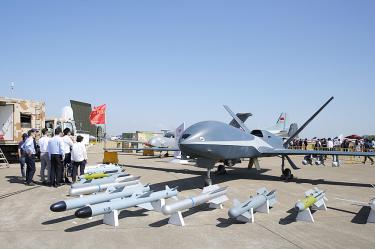Chinese bombers. Chinese hypersonic missiles. Chinese cyberattacks. Chinese anti-satellite weapons.
To a remarkable degree, the Pentagon budget proposal for next year is shaped by national security threats that Acting US Secretary of Defense Patrick Shanahan has summarized in three words: “China, China, China.”
The US is still fighting small wars against extremists and Russia remains a serious concern, but Shanahan seeks to shift the military’s main focus to what he considers the more pressing security problem of a rapidly growing Chinese military.
This theme, which Shanahan outlined on Thursday in presenting the administration’s proposed defense budget to the US Senate Armed Services Committee, is competing for attention with narrower, more immediate problems, such as US President Donald Trump’s effort to use the military to build a border wall.
Shanahan is hardly the first defense chief to worry about China.
However, he sees it as an increasingly urgent problem that exceeds traditional measures of military strength and transcends partisan priorities.
“We’ve been ignoring the problem for too long,” Shanahan told a US senator.
“China is aggressively modernizing its military, systematically stealing science and technology, and seeking military advantage through a strategy of military-civil fusion,” he wrote in prepared testimony to the committee, which is considering a US$718 billion Pentagon budget designed in part to counter China’s momentum.
The US$25 billion that the Pentagon is proposing to spend on nuclear weapons, for example, is meant in part to stay ahead of China’s nuclear arsenal, which is much smaller than the US’, but growing.
Shanahan said China is developing a nuclear-capable long-range bomber that, if successful, would enable China to join the US and Russia as the only nations with air, sea and land-based nuclear weapons.
Shanahan ticked off a list of other Chinese advancements — hypersonic missiles against which the US has limited defenses, space launches and other space efforts that could enable it to fight wars in space, “systematically stealing” of US and allied technology, and militarizing land features in the South China Sea.
Bonnie Glaser, director of the China Power Project at the Center for Strategic and International Studies, said that the US has been lacking effective strategies for competing with China on a broad scale.
“It is overdue,” she said of the Shanahan focus. “We have been somewhat slow in catching up” in such areas as denying China its regional ambitions, including efforts to fully control the South China Sea, which is contested by several other countries.
However, some defense analysts said Shanahan and the Pentagon have inflated the China threat.
“I do think it’s worth asking what exactly is threatening about China’s behavior,” said Christopher Preble, vice president for defense and foreign policy studies at the Cato Institute.
He does not discount China as a security issue, including in the South China Sea, but doubts the US military is the institution best suited to deal with such non-military problems as cyberintrusions into US commercial networks.
Competition with the Chinese is not mainly military, Preble said.
“I still don’t believe the nature of the threat is quite as grave as we’re led to believe” by the Pentagon, he said. “They tend to exaggerate the nature of the threat today.”
Source: Taipei Times - 2019/03/18









